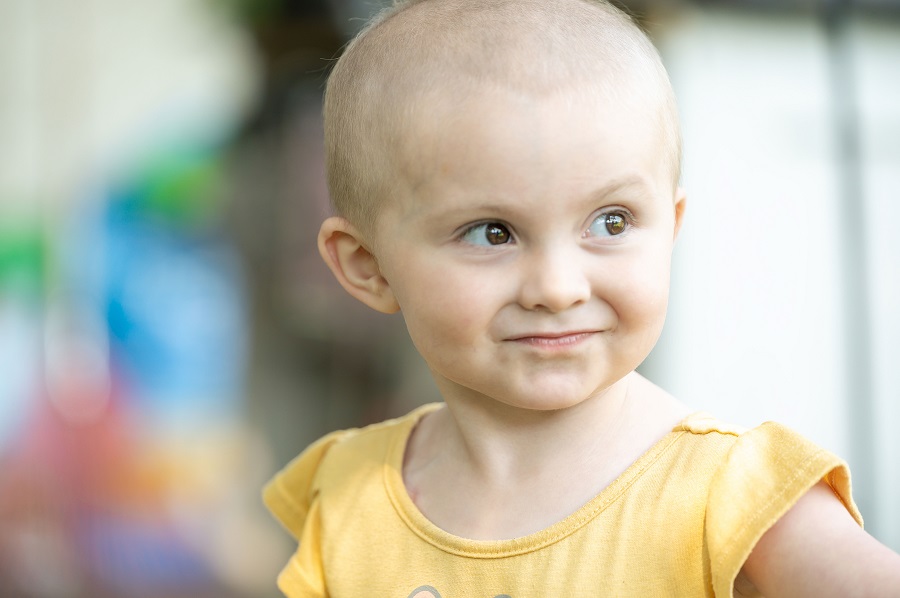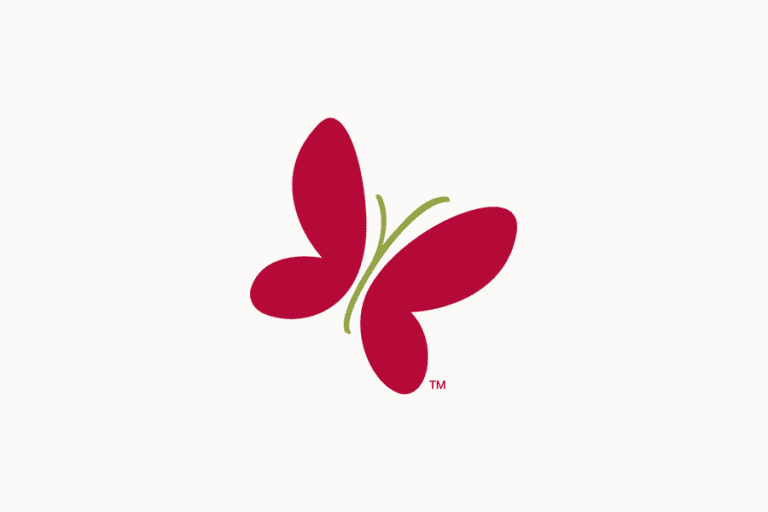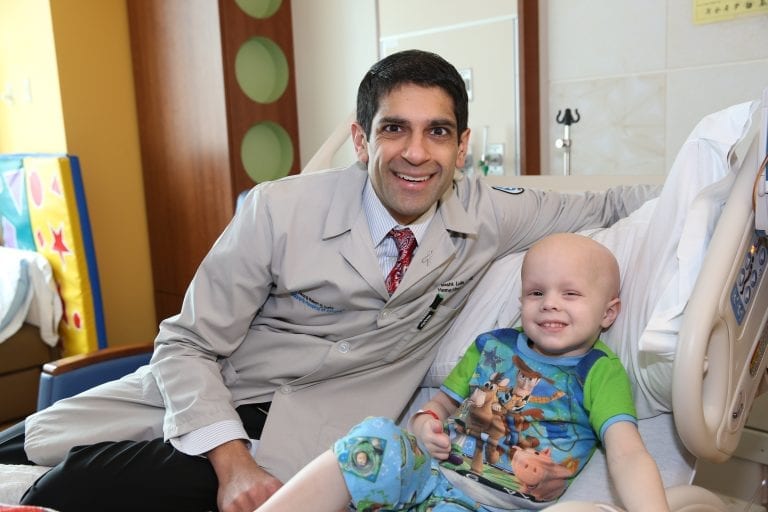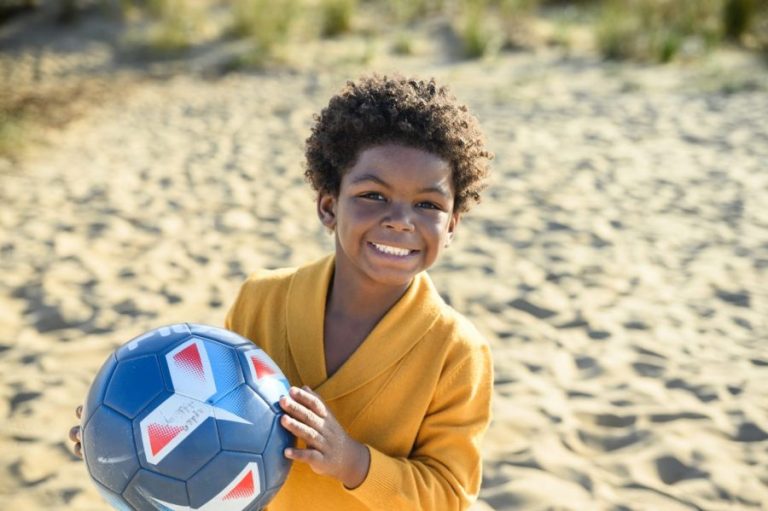The day before Anja was diagnosed with cancer, she had been playing in her first ever snowfall. She was a happy, energetic 9-and-a-half-month-old with a love of Mickey Mouse and Bluey. She was considered advanced for her age.
She’d always had on-and-off fevers and stomachaches, so when she spiked a fever yet again on New Year’s Eve, 2020 her mom, Nicky, took her to the emergency room. Nicky had recently had a dream during which a relative told her to push for an ultrasound for Anja, so when she got to the hospital, that’s what she did. The ultrasound findings were devastating – a softball-sized tumor in little Anja’s abdomen.
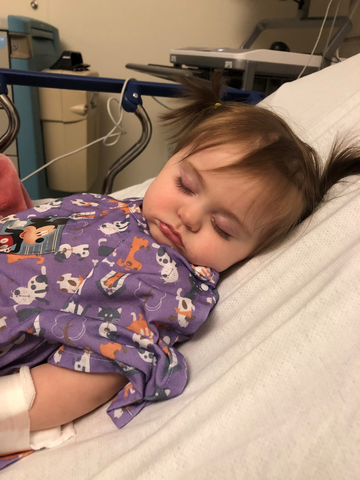
A sleepy Anja naps in the hospital a few months after diagnosis.
“I was by myself in the ER when they told me,” Nicky said. She had to inform Anja’s dad, Kyle, over the phone. Doctors later confirmed that Anja had hepatoblastoma, a type of liver cancer, and that she’d need major surgery to remove the tumor.
If surgery wasn’t scary enough, Anja’s recovery was even scarier. She was doing well after surgery when all of a sudden, she started to go septic, meaning bile from her liver was leaking into the rest of her body through her stomach, endangering her life.
“One nurse, Cassandra, caught it and really advocated for my daughter, saving her life,” Nicky said. She had to go into emergency surgery right away, and Nicky will never forget what Anja looked like as she went back into the operating room.
“The bile made her skin yellow, she looked like an Oompa Loompa but yellow,” Nicky said.
What People Don’t Understand about Childhood Cancer Treatment
Nicky had never heard of hepatoblastoma before Anja was diagnosed, and as she learned more about it, the more things surprised her.
First - It’s likely Anja’s cancer started growing before she was even born. Like most childhood cancers, there are no clear causes or environmental factors – you can do everything right and still get a cancer diagnosis.
Second – most cancer research is focused on adults. “People don’t understand that we put all the money into research for the adults, and sometimes that research helps kids, but not very often,” Nicky said. “But childhood cancer research directly helps kids and the things we learn from it almost always benefit adults with cancer, too. We’re doing this all backwards.”
Third - people are afraid cancer is contagious – it’s not. “Some moms at the park are afraid to let their kids come up to her,” Nicky says. “I tell the kids she just has special medicine, but she can still play with you. Cancer isn’t contagious.”
It Takes a Village
Because so much of Anja’s treatment took place during the height of the COVID-19 pandemic, extended family and friends weren’t able to support Nicky and Kyle in-person. Their community became the people in the hospital and people who went the extra mile to support them from afar – people Nicky says they will never forget. Anja’s village included:
- Cassandra, a nurse who took the time to explain what was going to happen in Anja’s treatment better than anyone else and taught Kyle to do Anja’s dressing changes so he could do them for her at home.
- Melissa, Anja’s nurse in the clinic who often crossed over in the hospital and made Anja feel at home.
- Dr. Chu and Dr. Lang, who honored Nicky’s request to be straight with her whenever they had scary news to share.
- Dr. Short, who did the impossible by surgically fixing Anja’s liver.
- Theresa, a social worker who helped Nicky and Kyle navigate the difficulties of cancer parent life.
- Julie, a coworker whose daughter had cancer years ago, served as a listening ear and communicated the latest updates to Nicky’s work colleagues so Nicky could focus on Anja. All of Kyle’s and Nicky’s co-workers were supportive.
- Everyone in the Bohm’s, Cronin’s, co-workers, and friends who supported them in many other ways other than being in them in person.
What’s Next for Anja?
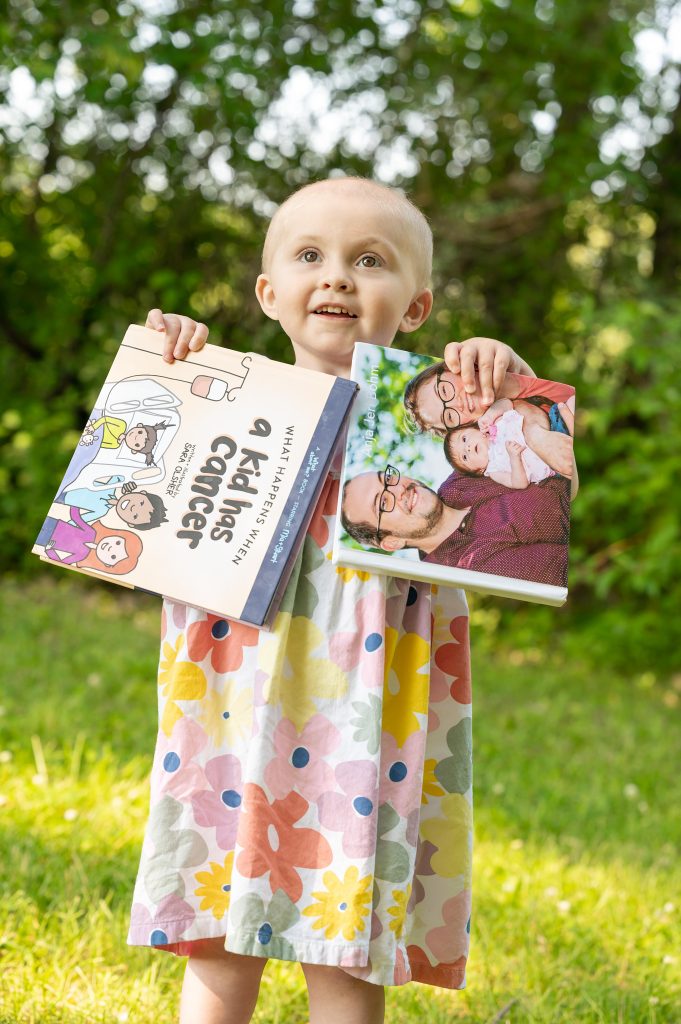
Anja holding the book "What Happens When a Kid Has Cancer" and a photo book about her own cancer journey.
Hepatoblastoma is a resilient cancer – it tends to find ways to hide from treatments and come back when treatment is over. After months of difficult treatment, Nicky and Kyle learned that Anja relapsed in late 2021 and in February 2022. Anja’s family and medical team decided to do surgery to remove the mass they found in Anja’s lung and re-start chemotherapy. As of May 2022, Anja has been cancer free. She recently graduated from her individual family service plan, a written plan created to meet the needs of kids with developmental delays, in Anja’s case, caused by her cancer treatment.
Nicky and Kyle have made an effort to share Anja’s childhood cancer experience – both to make other families feel less alone and to raise awareness for the need for better, safer treatments. Anja, now 3 years old, has spent too much of her young life in the hospital, and too many of her childhood experiences have been touched by cancer. The children’s books she reads include books about chemotherapy and losing your hair. Nicky helped put together a picture book of Anja’s cancer journey so far, which Anja shows to her doctors and nurses. When she’s feeling well, she loves to “mow the lawn” with her little mower, leaving a trail of bubbles behind her.
“Anja is doing so well it is a dream come true,” Nicky said.”This past January was the first January ever that Anja has been cancer-free. She’s had swimming lessons, visited Mommy at school and went to the science museum. She absorbs every new experience and adventure.”
We can do more for kids like Anja.
Cancer treatments for kids like Anja often haven't improved in decades - but we believe we can do better by funding research. Your gift supports researchers searching for better, safer treatments for kids fighting cancer.

